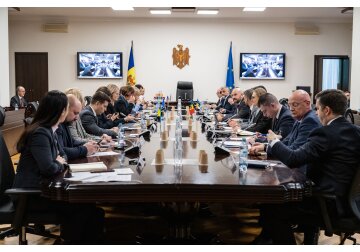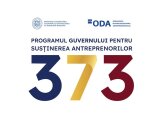
Moldova, Romania, Ukraine, the EU and the USA will intensify efforts to modernize strategic corridors in the Danube region
Ministry of Infrastructure and Regional Development reported this, noting that this was discussed at the high-level ministerial meeting in the QUINT format held in Chisinau, which brought together representatives of Moldova, Romania, Ukraine, the USA and the EU to discuss common priorities in the development of transport infrastructure and strategic corridors connecting the Danube region. Moldova's Minister of Infrastructure and Regional Development, Vladimir Bolea, emphasized the importance of regional cooperation for connecting transport infrastructure and ensuring the flow of goods. He noted that Moldova remains firmly committed to the efforts to modernize strategic transport corridors. “We will focus on modernizing the strategic corridors connecting our country with Romania, the European Union and Ukraine, in order to contribute to a deeper integration into the European transport networks,” Vladimir Bolea said. He emphasized the key role that Moldova's infrastructure can play in Ukraine's future recovery process. “Ports in Giurgiulesti, highways and railways can become crucial routes for the transportation of construction materials, contributing to the economic and social recovery of the region,” he added. Within the meeting, EU Director General for Mobility and Transport (DG MOVE) Magda Kopczyńska called for maintaining the QUINT format to implement new infrastructure and transport projects that support the sustainable development of the Danube region. For his part, US Assistant Secretary of State for European and Eurasian Affairs James O'Brien emphasized the result of the cooperation. “The QUINT format is one of the most effective working groups. The partnership between Moldova, Romania and Ukraine is working, and the lessons learned from joint initiatives are evident. For example, conducting joint border control has contributed significantly to increasing transportation capacity, showing concrete results of our cooperation. Although we see attempts at destabilization by Russia through disinformation and threats in the energy sector, this partnership remains strong,” said James O'Brien. Romanian Minister of Transport and Infrastructure Sorin Grindeanu emphasized Romania's strategic role in supporting Ukraine. He noted that since the beginning of the war, the total volume of goods exported from Ukraine through Romania using the Sulina branch and the Port of Constanta amounted to about 49% of total Ukrainian exports, confirming the importance of the Danube Corridor. “Our investments in infrastructure continue, we will launch a new project that will ensure that the ports are utilized to their full capacity. These efforts reflect our solidarity in the face of difficulties,” Sorin Grindeanu said. Serhiy Derkach, Deputy Minister for Communities, Territories and Infrastructure Development of Ukraine, called the meeting extremely important not only for Ukraine, but also for other countries in the region, given the need to maintain cargo traffic from Ukraine to 40 other countries and to ensure food stability at the global level. “This is a unique forum where sometimes difficult but necessary topics are raised. We had a very fruitful meeting during which we defined our actions for 2025 to ensure transportation capacity,” the Ukrainian official said. Among the recent achievements highlighted at the event were the implementation of joint border control with Ukraine and the signing of coordinated control agreements with Romania. These initiatives make a significant contribution to facilitating transportation and trade in the region. In this regard, the expansion of coordinated controls in both directions Galati-Giurgiulesti was discussed. The meeting concluded with joint commitments to accelerate infrastructure projects in the Danube region to support Ukraine's recovery and create a stable and prosperous environment for all participating countries. // 14.01.2025 - InfoMarket.







